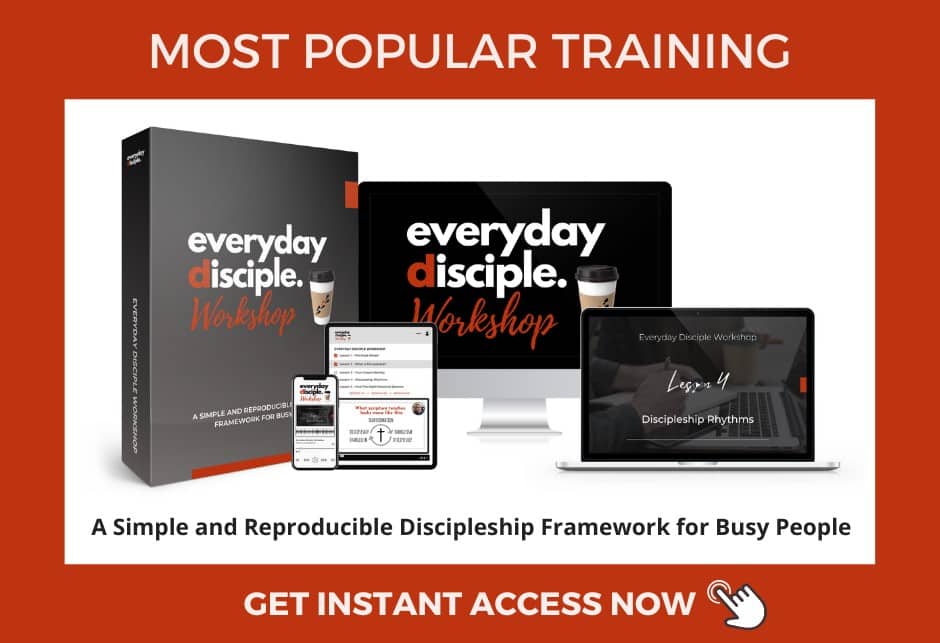In this episode of Ask Caesar #7, Chris asks the question: “How do I begin to lead my Small Group or church toward true missional living? I want our folks to really live an authentic ‘everyday faith’ in community with others. How do we begin?”
Thanks for asking Chris, I have been EXACTLY where you’re at, and it can seem daunting to say the least!
My wife and I stumbled around this stuff for years too, but now, after living this way, and training others around the world, we’ve found that there are some foundational steps that absolutely cannot be missed.
This works everywhere
This is a little bit similar to the question I answered last week, but more focused on leading small groups toward authentic faith and true discipleship. And regardless of the context; city, suburban, rural, European or elsewhere, I have found that before we can effectively lead others to know and follow Jesus in real, tangible ways in everyday life, this must become a reality in our own lives and homes.
[clickToTweet tweet=”True discipleship starts at home–moves into community–then expands to include others.” quote=”True discipleship starts at home–moves into community–then expands to include others.”]
7 Essential Steps
Here are 7 simple, yet important steps you’ll need to lead your folks to master so that their “faith in practice” becomes more like a family and begins to move outward to include others:
1. Believe and learn to articulate a much bigger gospel–one that touches every area of your lives today.
So often our understanding and articulation of the gospel – the good news about Jesus’ life, death and resurrection – seems to have more to do with our afterlife than this life. Is this how we communicate the Good News to our spouse, kids and others in our small group too? Not always helpful.
We all need to understand how Jesus, and being a follower of his, will affect our marriages, parenting, finances, identity, spending habits etc.
How “gospel fluent” are we?
2. Start making family dinners more meaningful and an attractive door into community for others.
Your own family meal times are the best opportunity you have for discipling your kids, each other, and eventually, those God has called you to make disciples among. (If you’re not married with kids, do this with close friends and new relationships.)
Any meal of the day can be special, and maybe for you it’s not always going to be dinnertime that everyone can get together, but I want to encourage you to pick one to three meals/nights per week that you put on your calendar and EVERYONE knows that those are “sacred” times. Not to be missed. Predictable patterns are key!
Family dinner times can intentionally bring fun, learning and the Kingdom of God to bear in a tangible way. It also serves as a training ground and a model for how you and your family will live in community with others.
3. Find natural places in your city or neighborhood that are a perfect fit for you to make new friends and build relationships.
Frequenting a café, favorite restaurant, pub or park gives you new opportunities to meet people that live near you, have similar interests and may be open to relationships. This will begin to turn your life, and your group focus outward.
Where do people go to have a good time, and make or be with friends, in your neighborhood? As you go there and ask good questions, listen and live generously, people will be attracted to you and interested in your life and family.
Ask God to guide you and give you divine insight in all of this as you “pick your place”.
4. Identify which new friends and acquaintances are “leaning in” to relationship and a possible faith journey with you.
This is how your small group or church can grow organically–not just from Sunday growth.
There are people that God has divinely appointed for you, your family and friends to disciple and do life with.
These “people of peace” seem easy to make friends with. Look for those who are open to you, interested in you, like you and want to be around you. Often these special people look to serve you very early in the relationship.
You are not looking to gather a crowd.
5. Learn to trust the Holy Spirit to guide your next steps with people, and together as a community.
“What do I do with these new folks that are starting to hang around?!”
As you start building relationships with others you may feel the stress of not knowing how to perfectly love and disciple them, or how to begin to include them in our group or community life.
And often we find it hard to even start on a new endeavor like this because we want to know all of the steps before ever getting started.
Lose the anxiety over moving these relationships toward spiritual discussions and life in community. Ask God to show you the very next steps you need to take, and then do that! (This “What Next, Lord?” story and journal may help you get started.)
6. Create predictable patterns and environments for relational growth that are inviting and eventually help people want to join you and your community.
Christian faith in community is life together in the family of God. God is our Father and expects us to treat others as family too.
What would it be like if you were to invite just one or two not-yet believers (these new friends) to share a meal with you each week? You’re eating anyway, so not much extra time is required!
Things won’t happen like throwing on a light switch, but again, predictable patterns are key here. Get out your calendar and commit to a new rhythm today.
7. Learn to teach the Word of God in a powerful, yet simple way that is reproducible and fun for everyone.True discipleship is built on the words, ways and works of Jesus. Learning to teach the Bible and impart Kingdom patterns and understanding in a reproducible way is foundational if your goal is to make and be mature disciples.
With your family and with others, learn to teach the Story of God as a story in a narrative and dialogical manner that levels the playing field for “experts” and newbies alike.
I know of no other method of teaching the Bible and helping others grow in their understanding of who God is and who he has made us to be than this method. This is how we have started and matured EVERY group we’ve been a part of.
For more information and free resources on how to do this with your family and small group, check this out.
Those Are The Basics…Now Get Started!
These seven, proven steps may seem simple, or even a little obvious, but they work and are just the beginning. The next best time to begin, trust God, and continue to be trained and resourced is now. There is no limit to how far this will take you if you apply these 7 moves to your life.






